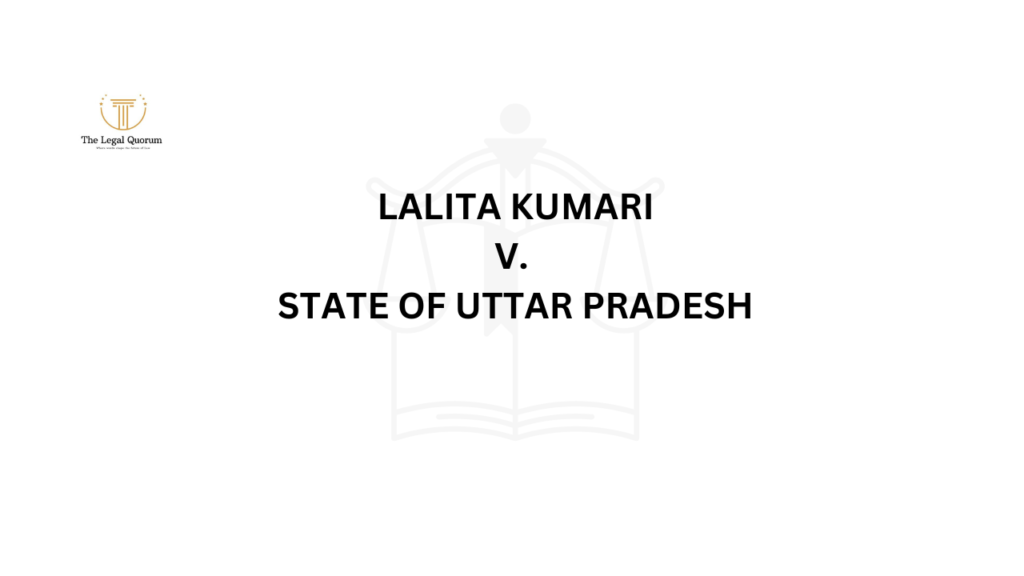Published on 12th February 2025
Authored By: S. SRUTHI
THE CENTRAL LAW COLLEGE, SALEM
Citation: 2023 SCC ONLINE SC 435
Court: Supreme Court of India
Bench: Hon’ble Justices B.R. Gavai, P.S. Narasimha, and J.B. Pardiwala
FACTS
The case revolves around Teesta Atul Setalvad, a well-known social activist, accused of fabricating evidence and influencing witnesses during investigations into the 2002 Gujarat riots. She allegedly attempted to implicate senior political figures, including the then-Chief Minister of Gujarat. The accusations include forging documents and submitting false testimonies in court.
Setalvad approached the Supreme Court for anticipatory bail after the Gujarat High Court declined her request. The charges against her raised questions about the misuse of activism and the potential infringement on judicial integrity.
The case was brought into sharp focus as it intersected the rights to personal liberty under Article 21 and the importance of protecting the judicial process from interference.
ISSUES RAISED
- Whether the petitioner’s actions constituted interference with the judicial process by fabricating evidence ?
- Whether anticipatory bail could be granted, balancing the right to personal liberty with the seriousness of the allegations ?
CONTENTIONS OF THE PARTIES
By the Petitioner (Teesta Atul Setalvad):
The petitioner argued that the case was a politically motivated attempt to silence her activism and advocacy for justice for the riot victims. Setalvad maintained that her efforts were an exercise of her fundamental right to freedom of speech and expression. The petitioner claimed the allegations were baseless and that there was no credible evidence to substantiate the charges against her. She maintained that the rejection of anticipatory bail violated her right to personal liberty under Article 21 of the constitution.. The petitioner contended that her activism was instrumental in bringing to light several lapses in the handling of the Gujarat riots cases, thereby aiding justice.
Setalvad relied on past judgments that favored granting bail in cases where the allegations were yet to be proven and the accused had cooperated with investigations.
By the Respondent (State of Gujarat):
The State argued that Setalvad deliberately fabricated evidence and coerced witnesses to implicate individuals, including government officials, to falsely portray a larger conspiracy. It contended that her actions undermined the credibility of the judicial system, amounting to a serious offense. The State emphasized the necessity of custodial interrogation to unravel the extent of her alleged misconduct and verify the evidence.
The State claimed that the petitioner’s actions disrupted the functioning of the government by promoting false narratives, leading to public mistrust. The respondent highlighted the risk that granting anticipatory bail could enable the petitioner to tamper with evidence or influence witnesses further. The State argued that activism should not serve as a cover for illegal acts and that no individual, regardless of their social standing, is above the law.
JUDGMENT
The Supreme Court dismissed Teesta Setalvad’s anticipatory bail plea. The Court held:
- Seriousness of Allegations: The accusations of fabricating evidence to mislead judicial proceedings were deemed grave and warranted thorough investigation.
- Judicial Sanctity: The Court emphasized the need to preserve the integrity of the judicial process and highlighted the potential harm caused by attempts to interfere with justice.
- No Absolute Immunity: The Court ruled that activism cannot serve as a shield for illegal activities and that legal processes must be allowed to take their course.
RATIONALE
The Court adopted a meticulous approach, balancing the competing interests of individual liberty, public interest, and the integrity of the judicial system.
Rule of Law: The Court reiterated that the rule of law is paramount in a democracy. It emphasized that every citizen, irrespective of their social or political stature, is subject to the law, and any violation must be addressed through appropriate legal channels.
Judicial Independence and Integrity: By alleging fabrication of evidence, the petitioner’s actions posed a direct threat to the independence of the judiciary. The Court underscored the necessity of maintaining the sanctity and credibility of the judicial process. Any attempt to manipulate or mislead the courts not only undermines justice but also erodes public trust in the judiciary.
Activism vs. Accountability: While the Court acknowledged the critical role of activism in a democracy, it cautioned against using activism as a pretext for illegal acts. It stressed that freedom of expression and activism must operate within the boundaries of the law, ensuring that these liberties are not misused to distort judicial processes.
Custodial Interrogation as a Tool for Truth: The Court justified the need for custodial interrogation, highlighting its importance in uncovering the extent of alleged misconduct. Such interrogation is essential in cases involving serious charges like evidence tampering, as it enables investigators to access critical information.
Balancing Personal Liberty and Public Interest: While recognizing the fundamental right to personal liberty under Article 21, the Court clarified that this right is not absolute. In cases involving allegations of judicial interference, the public interest in preserving the sanctity of the judicial process outweighs individual liberties.
Precedent and Proportionality: The Court drew upon previous rulings to establish a precedent that prioritizes the integrity of legal proceedings over individual claims of persecution. The principle of proportionality was applied to ensure that the measures taken, such as denying anticipatory bail, were appropriate and necessary to address the severity of the allegations.
DEFECTS OF LAW
Absence of Specific Regulations for Activism and Judicial Accountability: While activism plays a vital role in democracy, there is no clear framework to address instances where activism oversteps legal boundaries.
Delay in Addressing Fabrication Allegations: The absence of stringent timelines in handling cases of alleged evidence tampering delays justice and undermines judicial credibility.
Overarching Discretion in Bail Matters: The lack of uniform guidelines for granting or rejecting anticipatory bail leads to inconsistent judicial decisions, particularly in politically sensitive cases.
INFERENCE
The judgment in Teesta Atul Setalvad v. State of Gujarat underscores the judiciary’s responsibility to balance individual rights with the integrity of judicial processes. It reiterates the principle that activism and freedom of speech, though vital in a democracy, must operate within legal boundaries.
This case highlights the judiciary’s role in protecting democratic values while ensuring that attempts to misuse judicial processes are addressed promptly and firmly. It also calls for a nuanced approach to bail jurisprudence, particularly in cases involving serious allegations of judicial interference.
The judgment serves as a cautionary tale, emphasizing the need for accountability in both activism and governance. While the Court’s decision may have implications for future cases involving activists, it reiterates the foundational principle that the rule of law must prevail over individual interests.
CONCLUSION
The case serves as a benchmark for balancing activism, individual liberties, and the sanctity of judicial processes. It calls for greater clarity in addressing the intersection of activism and law and ensures that the judicial system remains robust and impartial. The Court’s insistence on accountability and adherence to legal principles underscores its commitment to upholding the Constitution and the rule of law.




